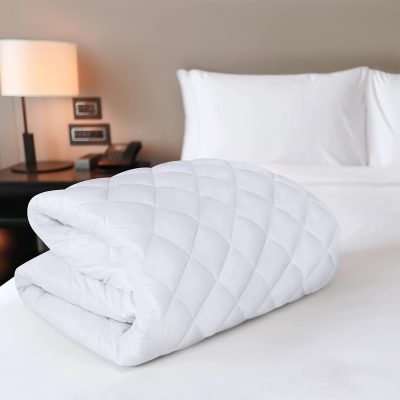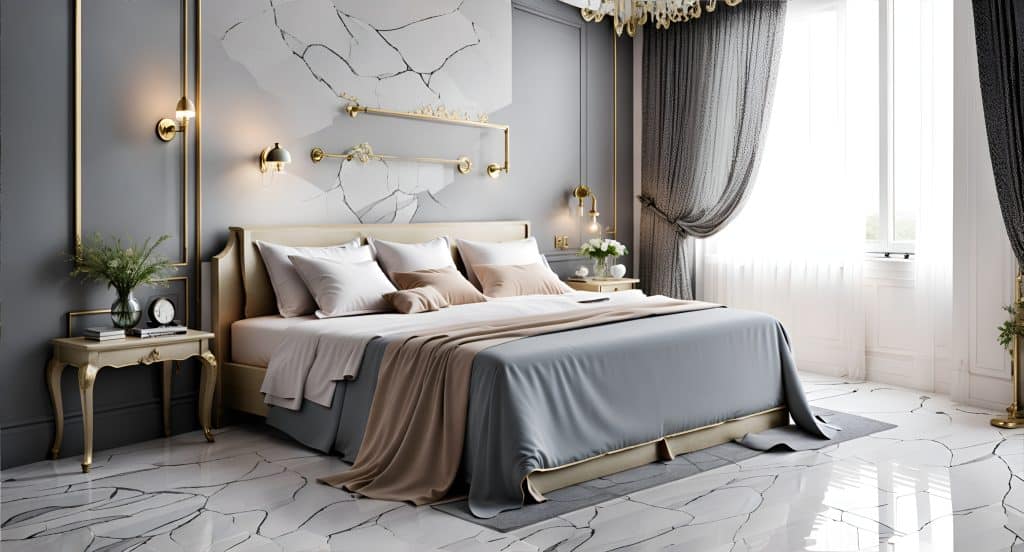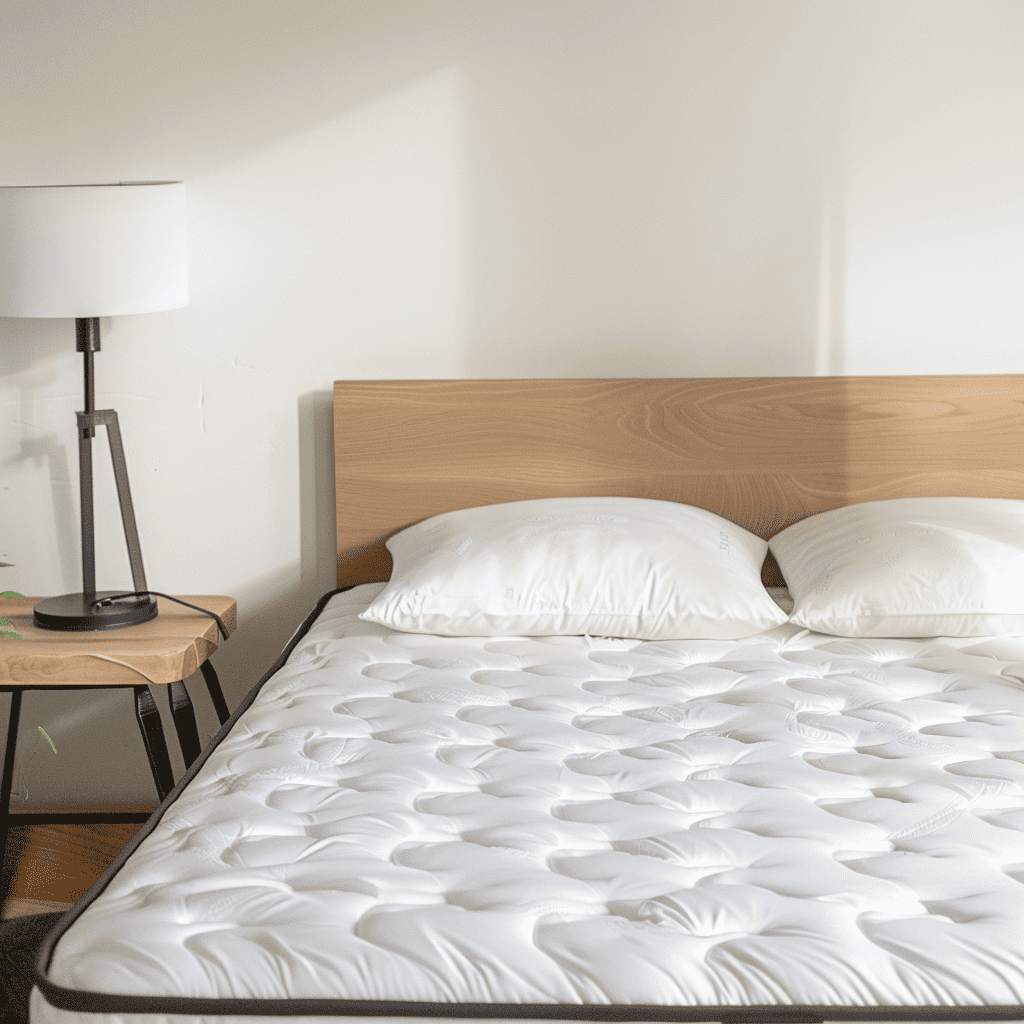Your mattress is among the most important purchases you will ever make in your life. Along with your bed, it is where you will spend a substantial amount of your time, perhaps as much as one third of each day. So choosing the best mattress to give you quality sleep is a decision that merits consideration. Naturally, it is then sensible to protect your investment and ensure that your mattress remains clean, damage free and comfortable – and this is where mattress covers come in.
Our Recommendation 🇺🇸

Utopia Bedding Mattress Protector
This mattress pad cover, with its quilted design, is not only long-lasting but also crucial for protecting your mattress from stains. Its ultra-soft quilting filled with fibers offers added cushioning, ensuring a more comfortable rest. Moreover, the surrounding elastic ensures it stays in place perfectly.
Can I Wash My Mattress Protector?
Not only can you, but you should – and mattress protectors are designed to be washed regularly. Clearly, washing a mattress protector is easier than, and infinitely preferable to, having to clean the mattress itself. Having a cover that can be easily removed and placed in the washing machine is a real asset. That said, you should always check the manufacturer’s instructions as some protectors may have limits on the temperature during washing or the amount of detergent you can use. Washing prevents bugs and allergens as well as keeping your mattress clean and fresh.
Do I Really Need a Mattress Protector?
If you want to protect your investment, yes. It will minimise wear and tear and so extend the life of your mattress, protect it against allergens, stains, spills, dust mites and bed bugs, and so maintain the quality on which your sleep depends.
Aren’t Mattress Protectors Uncomfortable?
No – in fact, mattress protectors are designed to be quiet and to enhance the comfort of your mattress, being created from materials such as cotton or terry cloth. If you notice you are using one, it will only be because there is a softer feel to your mattress, but without compromising its firmness.
Will I Feel Hotter With a Protector?
Almost certainly not. There was a time when this was an issue, but today’s protectors are more breathable and allow for a good flow of air. Some even have an integrated cooling technology to add to your comfort.
Can I Use a Protector With a Memory Foam Mattress?
You can use a protector with any type of mattress. Memory foam remains effective and is not compromised by the addition of a mattress protector. You will still get all the support you need.
Are There Any Additional Benefits?
There are. For example…
- Health. Mattress protectors reduce the risk of allergens and protect you from the kinds of bugs that can be a real nuisance and a health hazard. Placing an extra layer over your mattress is a welcome safeguard.
- Insurance. In case you didn’t read the small print when you bought your mattress, spills and stains can void your warranty, meaning you could find yourself having to replace your mattress unexpectedly. A protector guards against this possibility and is an insurance against the additional expense that can be incurred in the event of accidents.
- Durability. A mattress protector could as much as double the life of your mattress.
When it comes to buying a mattress protector, it’s always a good idea to consider consumer reviews and preferences to discover the best options. Additionally, there are a few critical features to consider:
One of the most important factors is the protector’s effectiveness against leaks and spills. A high-quality protector should offer comprehensive coverage, not just protect against localized wetness. Due to the body’s natural movement during sleep, there’s a risk of leaks extending to the sides of the mattress. Hence, it’s crucial to choose a protector that adequately fits all sides of your mattress and efficiently absorbs moisture, preventing any leaks from seeping beyond the protector. For severe leakage, a zippered protector offering six-point coverage might be the way to go.
If you’re prone to allergies or have asthma, consider the materials of your protector. Dust mite resistance is crucial for those with environmental allergies. Also, ensure the protector doesn’t contain any rubber or vinyl if you’re allergic to these materials, as reactions can be severe. If asthma is a concern, inquire about the hypoallergenic properties of the protector.
Size matters when choosing a mattress protector. While some low-quality protectors offer a one-size-fits-all approach, it’s best to choose one that matches your bed’s size (Twin, Queen, Full, King, etc.). Top-tier protectors are typically slightly smaller than your mattress’s dimensions, allowing them to stretch and provide a snug fit, ensuring maximum protection.
Comfort is paramount. The protector’s top layer, which absorbs moisture, can be made from various materials, like polyester blends or combed cotton. Select a material that you find the most comfortable and check customer reviews for insights into the softness and coziness of the top layer. You might be surprised to find that certain high-quality polyester blends are softer than some cotton weaves.
In conclusion, a high-quality mattress protector not only extends the lifespan of your mattress (and thus its warranty) but also provides unparalleled comfort, essential for a good night’s sleep. Therefore, opt for a protector backed by a warranty or guarantee, and take time to explore different brands as personal preferences may vary. Customer reviews are often an honest source of information, especially when it comes to personal comfort. By following these guidelines, you’re bound to find the perfect mattress protector for you.




